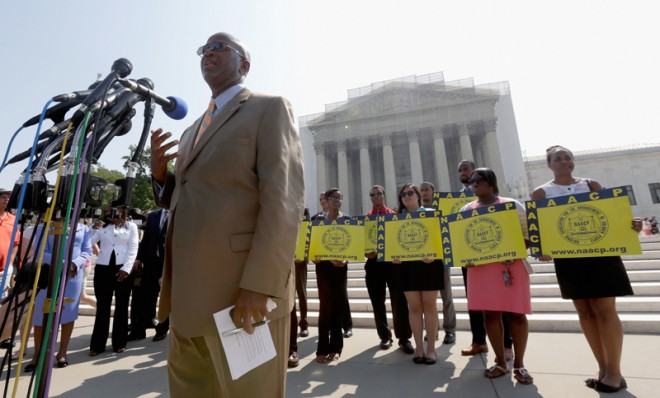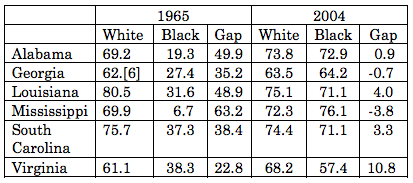Supreme Court strikes down a central pillar of the Voting Rights Act
In a transformational ruling, the high court says a decades-old formula intended to protect vulnerable voters is now outdated


A free daily email with the biggest news stories of the day – and the best features from TheWeek.com
You are now subscribed
Your newsletter sign-up was successful
The Supreme Court on Tuesday struck down a key part of the 1965 Voting Rights Act, ruling that Section 4 of the law is unconstitutional.
In a 5-4 ruling, the court said that Section 4, which established a formula for determining which historically discriminatory jurisdictions needed Justice Department approval before changing their voting laws, was critical to protecting minority voters in the 1960s, but outdated today.
"Our country has changed, and while any racial discrimination in voting is too much, Congress must ensure that the legislation it passes to remedy that problem speaks to current conditions," Chief Justice John Roberts wrote in the majority opinion.
The Week
Escape your echo chamber. Get the facts behind the news, plus analysis from multiple perspectives.

Sign up for The Week's Free Newsletters
From our morning news briefing to a weekly Good News Newsletter, get the best of The Week delivered directly to your inbox.
From our morning news briefing to a weekly Good News Newsletter, get the best of The Week delivered directly to your inbox.
In the case, Shelby County v. Holder, the court did not, however, invalidate the entire act.
"Our decision in no way affects the permanent, nationwide ban on racial discrimination in voting found in [Section] 2. We issue no holding on [Section] 5 itself, only on the coverage formula. Congress may draft another formula based on current conditions," the majority opinion reads.
Section 5 of the VRA required all state and local governments with a history of discriminating against voters — most of them in the South — to get "preclearance" from the Justice Department before making any changes to their voting laws, no matter how minor. That included changes like moving polling locations, redrawing districts, or imposing voting registration requirements.
The Justice Department exercised that power in the last election cycle to block voter ID laws in Texas and South Carolina.
A free daily email with the biggest news stories of the day – and the best features from TheWeek.com
While the court said that preclearance in itself was constitutional, the Justices took issue with the formula, created under Section 4, that determined which states and municipalities should be subject to it. In his majority opinion, Roberts said census data showing that voter turnout among African Americans exceeded that of whites in some places proved that "the conditions that originally justified these measures no longer characterize voting in the covered jurisdictions."
The court made that point with the following chart, contained in the majority opinion, that compared voter registration numbers in the six states originally covered by the VRA:

Originally passed in 1965, the VRA is considered one of the most important pieces of civil rights legislation ever. Rep. John Lewis (D-Ga.), a former civil rights leader, expressed his disappointment with the the ruling.
Section 5 of the VRA was originally supposed to last just five years. Congress renewed it multiple times, most recently in 2006 when lawmakers extended it for another 25 years, but left the coverage formula untouched.
Although Tuesday's ruling in effect left the bulk of the VRA intact, as SCOTUSBlog's Amy Howe noted, "it will have no actual effect unless and until Congress can enact a new statute to determine who should be covered by it."
Roberts made that point as well, adding that "Congress must ensure that the legislation it passes to remedy that problem speaks to current conditions."
Roberts was joined by Justices Scalia, Kennedy, Thomas, and Alito. Justices Ginsburg, Breyer, Sotomayor, and Kagan dissented.
In a strongly worded dissent, Ginsburg said Congress' power under the 14th and 15th Amendments to guard against voter discrimination deserved "substantial deference" from the court.
"Congress approached the 2006 reauthorization of the VRA with great care and seriousness," she wrote. "The same cannot be said of the Court's opinion today."
Jon Terbush is an associate editor at TheWeek.com covering politics, sports, and other things he finds interesting. He has previously written for Talking Points Memo, Raw Story, and Business Insider.
-
 Are Hollywood ‘showmances’ losing their shine?
Are Hollywood ‘showmances’ losing their shine?In The Spotlight Teasing real-life romance between movie leads is an old Tinseltown publicity trick but modern audiences may have had enough
-
 A dreamy long weekend on the Amalfi Coast
A dreamy long weekend on the Amalfi CoastThe Week Recommends History, pasta, scenic views – this sun-drenched stretch of Italy’s southern coast has it all
-
 Can foster care overhaul stop ‘exodus’ of carers?
Can foster care overhaul stop ‘exodus’ of carers?Today’s Big Question Government announces plans to modernise ‘broken’ system and recruit more carers, but fostering remains unevenly paid and highly stressful
-
 The billionaires’ wealth tax: a catastrophe for California?
The billionaires’ wealth tax: a catastrophe for California?Talking Point Peter Thiel and Larry Page preparing to change state residency
-
 Bari Weiss’ ‘60 Minutes’ scandal is about more than one report
Bari Weiss’ ‘60 Minutes’ scandal is about more than one reportIN THE SPOTLIGHT By blocking an approved segment on a controversial prison holding US deportees in El Salvador, the editor-in-chief of CBS News has become the main story
-
 Has Zohran Mamdani shown the Democrats how to win again?
Has Zohran Mamdani shown the Democrats how to win again?Today’s Big Question New York City mayoral election touted as victory for left-wing populists but moderate centrist wins elsewhere present more complex path for Democratic Party
-
 Millions turn out for anti-Trump ‘No Kings’ rallies
Millions turn out for anti-Trump ‘No Kings’ ralliesSpeed Read An estimated 7 million people participated, 2 million more than at the first ‘No Kings’ protest in June
-
 Ghislaine Maxwell: angling for a Trump pardon
Ghislaine Maxwell: angling for a Trump pardonTalking Point Convicted sex trafficker's testimony could shed new light on president's links to Jeffrey Epstein
-
 The last words and final moments of 40 presidents
The last words and final moments of 40 presidentsThe Explainer Some are eloquent quotes worthy of the holders of the highest office in the nation, and others... aren't
-
 The JFK files: the truth at last?
The JFK files: the truth at last?In The Spotlight More than 64,000 previously classified documents relating the 1963 assassination of John F. Kennedy have been released by the Trump administration
-
 'Seriously, not literally': how should the world take Donald Trump?
'Seriously, not literally': how should the world take Donald Trump?Today's big question White House rhetoric and reality look likely to become increasingly blurred
